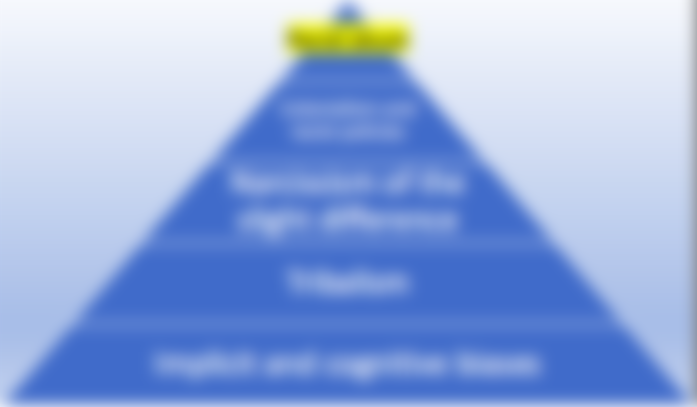Mass shootings are more than just common in a gun loving country like America, think of it as a sick festive tradition where some depressed asshat pulling up a gun and shoot whoever this nut-job pleases. Like many other festive traditions, this sick ritual of bloodshed happens not only yearly, but seasonally. From the tragic death of Breonna Taylor to the recent Atlanta spa shooting that claimed the lives of 6 Asian women ( including 2 others ). Not to mention the countless Asian lives harmed by this newfound hatred over the past few years.
In light of the increased violence towards the Asian American Pacific Islanders community (AAPI) observed in America due to the COVID pandemic, I spent copious amounts of time discussing with you, my reader, the pervasiveness of racism, how our obsession with race perpetuates racism itself in the first place and what we can learn and improve from these repeated displays of overt/covert racial discrimination.
Why racism is ubiquitous
When you're talking about a social issue that is as old as homo sapiens itself, you somehow discover that this has something to do with our human nature.
In fact, it stems from our very cognitive biases that helped the first humans to survive in our hostile world. As it has not been said enough times, we are not evolved for truth and compassion - we were evolved for opportunism and competition. To add on top of that, we tend to judge people based on their affiliations and conversely judge groups based on the actions of individuals ( aka. division/composition bias ).
As ancient humans we were constantly planning for survival and outsmarting other fellow humans, it is really a no-brainer that our 3-pound meat sack were hardwired to be tribalistic and hostile to the unknowns. Apart from that, it is of natural desire to feel belonged in a community, and this comes along with the tendency to discriminate between "us" and "them".
As a matter of fact, we humans also love to categorize things. In fact, our mind always put a label on something to create associations between our experiences, observations and the observed object itself. If you're seeing people coming from Sydney, you'd call them Sydneysiders. And when you see boats of yellow-skinned people washing up on Sydney's shores in the 70s, you call them boat people.
Categorizing is by no means harmful by itself, despite being the foundation of racism itself. A comprehensive study on 86000+ subjects revealed that everyone on Earth are the same 93% of the time and only 0.66% among them showed discrepancies of any kind. We all want the same thing, have the same values, and we all think alike. But yet, we seem to hyper-focus on the remainder 7% - i.e. languages, skin color and religion. Sigmund Freud named this tendency as "narcissism of the slight difference", where people get overly judgmental about our subtle differences in culture, custom and character. This phenomenon creates unnecessary hate, bigotry and the untold amount of suffering that comes with them.
All those implicit biases and innate proclivities aside, racism was further promoted and accentuated by nativism and colonialism. It was during the colonial era that scientists started to categorize people based on race, and that racist ideologies and apartheid policies were enshrined in law and in practice. This "divide and control" style of governance later evolved into institutional and systemic racism, the consequences from which we can still feel even in today. It also plays a part in enabling this vicious cycle of denigrating the victims and favoring the oppressors, by denying services, welfare and opportunities to those oppressed. As their room for upward mobility becomes smaller and smaller, the belief that minorities are inferior and unimportant has slowly become a self-fulfilling prophecy.
Just as history is the narrative of struggles between factions and tribes for supremacy, racism encapsulates our effort of pitting our race against others, and vice versa. Racism, as we know it, is ubiquitous, not only for it is the fossil record of our Darwinist culture, but also the fact that it is both omnipresent and widespread, both insidious and prominent.

Racism is inherently irrational and clearly stupefying, yet it's still not on everyone's radar.
America is home to one of the most racially conscious societies in the world. Pretty much 90% of its 20th-century history has something to do with civil rights movements or racial justice. Race has disproportionate influence over many aspects of the American public life - be it education, politics, employment and even housing. Much like the caste system in India, there is some form of racial hierarchy in place that more or less promotes European Americans ( aka. the Whites ) over minorities.
As racism is as American as baseball and road trips, I consumed countless news article about racial abuse, talk shows about racial justice and lengthy podcasts about the struggle for representation and growing-up-as-a-what-American anecdotes. Eugenics and racial pseudoscience has long waned, but we somehow get caught up in endless dialogues about these difficult topics even to this day and age.
It pains me to see people striving ceaselessly just to protect their dignity and to be accepted by their community. I wonder what our ancient predecessors would have thought if they were to witness this pure farce of a commotion.
You know, it's kinda ridiculous just how this seemingly harmless bias can morph into a generational nightmare. It's not a question whether we have given enough race education or have developed awareness in our communities, it is our unwavering obsession about this arbitrary concept called race that created the wedge between us in the first place. Many of us expend so much energy on tackling the first block in the pyramid but yet pay so little attention to the foundations that support it. Ignorance is the gravity that allows the pyramid of racism to stand firmly on the ground, virtually unshaken for centuries.
But there's hope, nonetheless.
Dismantling systemic racism requires us to attack the root cause of it: implicit biases. Even though we can't program humans to think in the way we should, we can instead train ourselves to be more thoughtful and compassionate by practicing self-awareness. For those who are not familiar with the concept, it basically points to our ability of being aware of our traits, behaviors and feelings. Even though too much of it can result in excessive self-judgment and anxiety, putting our own consciousness into perspective helps us to identify our psychological flaws and realize why we act the way we act. Self-awareness has been credited for its overarching benefits ranging from being able to delay gratification to having greater mental health stability. Even better than that, we start realizing how drunk and irrational we are when we arbitrarily profile people based on their appearance. When we put our biases and stereotypes about other racial groups into question, we may, in some time later, delve into the nature about the verb "hate" itself.
It must not be forgotten that humans are not born to be hateful, instead they learn to be hateful. Not only it is that blissful ignorance can sow hate/neglect towards people, we also inherit that sentiment from our peers, friends, community and even our families. When large groups of people come together, everyone's IQ just plummets. Division/composition bias entails that ignorance and hatred goes hand in hand in the context of racism.
Widespread ignorance would be pretty hard to attain if it had not been for the help of passivity. If everyone around you feels okay about racism and hate crimes, then the shame of mistreating minorities would wear away. And the less people around you speak up about it, the more likely we dismiss and put up with the mistreatment. Passivity and apathy is the inertia that prevents the abuser and the abused from ignoring their actions and behaviors. And when ignorance becomes the norm, #BlackLivesMatter and #StopAAPIHate will keep appearing on Twitter like how comets periodically pass by Earth.
Mass education on racial issues and online activism are indeed the most helpful strategies to deal with hate and ignorance. Condemning racial discrimination and calling out racist shooters on social media won't work unless we have the balls to challenge the shared worldview of every existing racist on this planet.
Now I'm not a qualified community organizer or a sitting politician to make a playbook on how to make it happen, but I strongly believe that in the near future there will be a solid pathway to full racial integration. Think integration as some form of a social superglue and our society as a vase broken into pieces by racism. Our society may look ugly and twisted now, but if we were to patiently "integrate" all the pieces together one by one until it becomes whole again, the fixed pottery looks more beautiful than it used to be, despite the cracks here and there. The beauty here represents the civility of our society and the cracks represent our fight for racial equity. The vase may be shattered again many times, but as long as we keep the faith and fix it up, it will one day become unbreakable. I'd say this is a nice crossover between the philosophy of Kintsugi and Nelson Mandela's nonviolent approach to racial harmony.
Lastly, I suggest that #StopAAPIHate should be rebranded as #StopAAPIIgnorance.

Some Indian guy when the visit America or other countries that time many people harassed by racism.